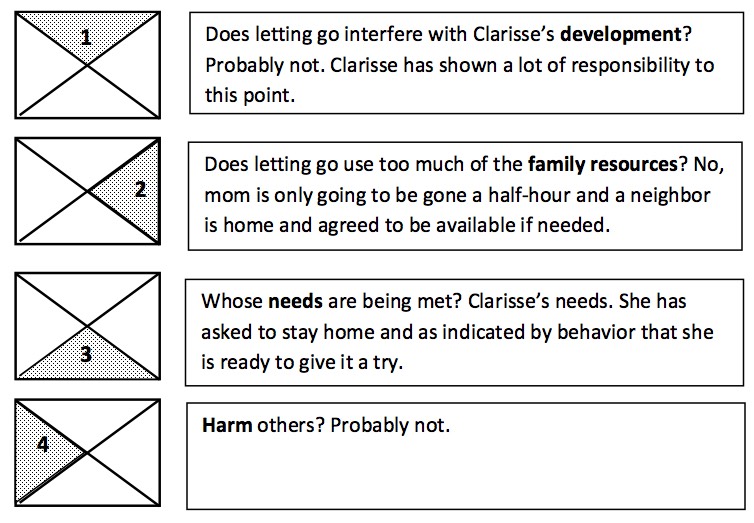
Is my child old enough to stay home alone?
When can children walk the dog around the block by themselves?
Should I help my child with homework or let them fail?
How much responsibility for self-care do I give my child with diabetes?
How do I avoid being a helicopter parent and still keep my child safe and healthy? I am worried.
As a parenting coach these are questions that I hear over and over again. These questions come from good hearted and loving parents that are trying to stay in the center of the parenting highway. Not to mention this topic has been in the news A LOT.
Letting go - to allow children to explore and make mistakes is important in order to raise competent, healthy, responsible children. But how does a parent let go especially when they are fearful for their child’s safety and health?
Start Simple
A child doesn't just start staying home alone because they turned a magic age. It is a process of building responsibility and letting go with much safer tasks.
To teach personal responsibility and to practice letting go, start teaching children to help with household tasks when they are two or three. Preschoolers love to be helpers and to feel competent.
Marty Rossman of the University of Minnesota completed a study looking at the relationship between the ages at which children started doing household tasks and their success as young adults. Rossman's study found that the most successful young adults in her study started chores by the age of three.
When your preschooler is learning to set the table, first give him the silverware- minus sharp knives-when he puts the silverware in the middle of the table, let go and celebrate a job well done. As he masters that task teach him how to put a spoon, fork and knife at each place setting. Once again let go and celebrate even if the spoon, fork and knife end up in the middle of the plate. As your child becomes more capable and confident you can raise expectation and start coaching your child by asking questions such as, “Where does the fork go?"
By teaching your child how to set the table and setting the bar low in the beginning and adjusting it higher as developmentally appropriate is good structure. By celebrating a job well done you are providing love and nurturing. Together these build healthy relationships.
Starting a cycle of teaching-coaching-celebrating, and, letting go with the simple things prepares both you and your child for greater responsibility and adventure.
How do you know if it is time to let go?
Use the Test of Four
The test of four is a tool parents can use to help them decide if they are doing too much for their child, by asking four questions.
A yes response to any of the four questions is a signal that you might need to practice letting go.
Development?
- Does it get in the way of the child learning a developmental task? If yes, which task?
Resources?
- Does it use a disproportionate amount of the family resources: money, space, time, energy, or focus, to meet the wants, not the needs, of one or more of the children?
Whose needs?
- Is this more for the parent than for the child?
Possible harm?
- Does it deplete or in some way harm others, property, the environment, the community?
The Test of Four Applied
Mom needs to run a quick errand and 10-year-old Clarisse would really like to stay home by herself. Mom has done a lot of teaching and coaching about stranger danger, and safety rules, and what to do if Clarissa needs help and mom is not there. Clarissa has done a good job following the rules when the risks are small. Would this be a good time for mom to practice letting go?

There is no clear “yes” here so, this might be a good time for mom to practice letting go.
Letting go is about finding a balance. It is about having enough rules and boundaries in place that allow children to safely make mistakes when the stakes are small so that they are able to make healthy and safe decisions as they get older.
Getting started:
1. What is one way you might practice safely letting go?
2. Does your child have the necessary skills and knowledge to complete the task?
3. If not what skills do you have to teach him first?
4. Will your child ask for help from safe adults if needed?
5. What are reasonable expectations given your child’s age and development?
6. How will you celebrate a job well done?
Lisa Krause MA., Certified Family Life Educator, parent coach and adjunct professor at Concordia University. Lisa is passionate about helping professionals and parents grow strong and healthy families. Click here to learn more about Lisa and Parent Coaching.
There is more help about avoiding overindulgence in How Much is Too Much? Raising Likeable, Responsible, Respectful Children – From Toddlers To Teens – In An Age of Overindulgence (2014, DaCapo Press Lifelong Books).
All photos from MorgueFile free photo, Graphic curtesy of Jean Illsley Clarke and Lisa Krause.


